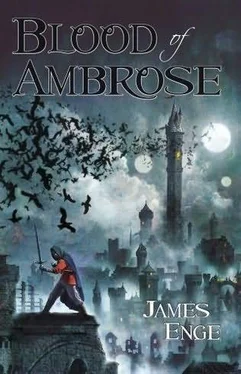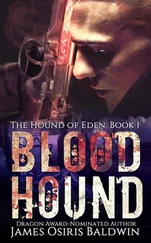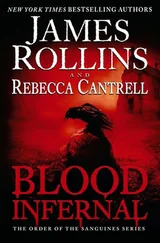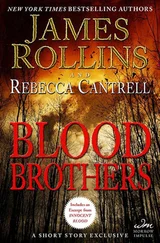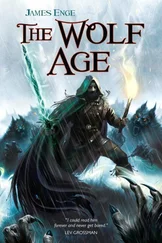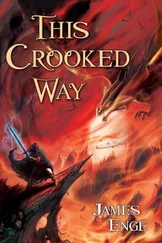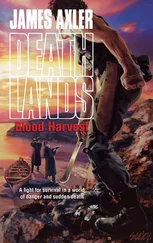Ambrosia became restless with this analysis. "Then best I be back at the city as soon as can be. Tell my brother-"
"No, my lady, wait. Morlock can counsel you better than I. I always see the debt side of a ledger."
"And Morlock is an optimist?"
"Morlock sees a way," the dwarf replies. "Always. Please wait till he awakes."
"I can't wait, Wyrth. If-"
The unconscious form lifted its hand. It drew a long, shuddering breath. "Wait!" it rasped, in a voice unlike Morlock's.
"I hate this," the dwarf complained. "When he speaks in a vision he hardly sounds like himself. I could almost believe another spirit has possession of him."
"Don't be superstitious, Wyrth. Morlock, I can't wait. Speak to me what you see."
Voice rasping, eyes closed, Morlock said, "The death in the Protector's Shadow sleeps and, sleeping, dreams.
"The death the Protector fears wears our faces like masks.
"The death to ease the Protector's pain wears our name, like gravestones.
"The wing rides over the plain."
"Shake him out of it," the dwarf said impatiently. "What does that mean, the wing rides over the plain'?"
"The wing enters the hills-"
"Canyon keep the wing. Wake up, Morlock!"
"He is waking," Ambrosia said. `Be quiet, Wyrth, you can't hurry him. `The flight must take its course,' as seers say."
"No," said Morlock, in a voice almost his own. "Wrong."
"What's wrong?" Ambrosia asked.
"Wing. Not flight. Shoes."
"A wing with feet?" Wyrth demanded.
Morlock looked puzzled, like a sleeper with a perplexing dream. "No feet. Shoes."
"Oh, that's plain. A wing with shoes, but no feet."
"Not plain," Morlock insisted. "Hills."
Ambrosia looked speculatively at her brother, then said to Wyrth, "I'll be back in a moment." She climbed a nearby hill and looked westward. After a moment she turned and came down again. She called to the horse and then said to Wyrtheorn, "Pick up my brother and carry him. We must be going."
"I don't understand."
"Wyrtheorn, what sort of wing rides rather than flies and has shoes but not feet?"
The dwarf glared at her. It was Morlock who answered, ascending (or descending) finally to full wakefulness.
"A cavalry wing," said the Crooked Man, "and almost upon us." He sat up. "Wyrtheorn, where are my clothes?"
Thousands of heartbeats later Wyrtheorn still had not gotten over it. "Wyrtheorn," he intoned to himself, "where are my slippers, where are my buttered biscuits, where my evening tea?"
Morlock, who was wearing the dirty, rusty, torn, bloody black rags that Wyrth had been prepared to discard, did not respond.
"Wyrtheorn," Wyrtheorn intoned, "bring me my rags."
"Shut up, Wyrth," Ambrosia said irritably. "They'll track us down by your whining alone."
"They won't track us at all," Wyrth rejoined. "They'll quarter the area and search. They're cavalry, not hunters. They'll find us, all right, but in their own good time."
"Can't you make your prentice be quiet?" Ambrosia asked her brother.
Morlock smiled. "No."
"Hmph," Wyrth said, to keep the conversation going. "Listen to this: I say we let the horse go."
The Ambrosii said nothing. The expression of pain sternly repressed was stamped on both their faces, bringing out the most fugitive likenesses. If it were possible Wyrth would have made them both be still and take some healing. Since it was not, he was determined to distract them.
"No, really," he said, as if they had answered him. "It-"
"We need the horse, Wyrtheorn," Morlock cut him off.
They proceeded through a silence punctuated by Wyrth's wisecracks. The sun was gone behind the dusty gray hills to the east, but its light was still in the sky and its heat was still in the dead valleys.
"Here," said Morlock.
Wyrtheorn looked around.
"There." Morlock scuffed a mark in the crumbling gray earth.
"Get away; I'll do it," the dwarf said irritably.
Morlock did not argue, but sat on a slope a few feet away. "Dig a square perhaps as long as my arm."
"Which arm?" the dwarf retorted, digging rapidly in the dry earth with his hard blunt fingers. It was not long before he laid bare a crystalline blade, blazing with white light. There were darker thornlike shapes within the light. Beneath the sword was a large pack made of dark canvas. Between pack and sword two small boxes made of translucent shining metal.
"What is that?" the dwarf said, pointing at the boxes.
"Aethrium," Morlock replied.
"And inside them?"
"Phlogiston."
"From …"
"I dephlogistonated the armor I fashioned, and most of the metal in the smith's shop."
The dwarf laughed in pure delight. "That was generous of you!"
"It was a partial payment for the trouble we put him to. A dephlogistonated implement is harder, denser, more durable."
"And you, of course, brought this dangerous matter away with you?"
"I saw a use for it."
"You will kill me with wonder, someday, Master Morlock."
"What's phlogiston?" Ambrosia asked.
Her brother replied didactically, "Phlogiston is the element in matter which is responsible for combustion. Burning, in fact, is simply the release of phlogiston resident in a given object."
"Does metal burn?"
"Everything burns," said Morlock, "unless it has been dephlogistonated. Metal burns in a peculiar manner, though. When a log burns and you weigh the residue, it weighs less than the original log. If you burn a piece of metal, the residue weighs more than the original piece."
"Then metallic phlogiston," remarked Ambrosia composedly, "weighs less than nothing."
"Considerably less. This has certain obvious uses …"
CHAPTER FIVE
PRISONERS OF GRAVESEND
The King of the Two Cities was coughing quietly in the darkness underneath the enclosure seats.
"Be quiet, please, Your Majesty," the Legionary captain, Lorn, whispered.
"It's the dust," the King explained, whispering back. "I'm sorry." He added impulsively, "I'm sorry for everything."
"You? Sorry?" the Legionary said incredulously. "No, Your Majesty. My fate was sealed when I set your Grandmother, as you call her, free. And yours was sealed when you declared her free. But free she was, and the Strange Gods can seize anyone who says otherwise, Protector's Man or no."
"I thought you were a Protector's Man, when you came to get me," the King confessed.
"I wasn't but three steps ahead of them, and that's the truth. Traitorous bastards. We're not all like them in the City Legion, Your Majesty-you mustn't believe that. If we get you back into Ontil, you'll be safe enough."
"But how will we get there?"
"We'll wait until it gets a little darker; then we'll make our way out of the enclosure. My squad will be waiting out there, as if on perimeter guard. Then we'll go to a city gate manned by loyal soldiers. From there on, we'll just guess and hope."
The King nodded, and they waited in silence for nightfall.
* * *
Steng was waiting on the stone steps of the anchor building when the Lord Protector and his chief henchman, Vost, stepped out.
"And where have you been?" Lord Urdhven demanded. He was furiously intolerant of any hint of disloyalty-which, Steng often thought, was rather ironic, given his own career.
"Hunting a king, Lord Urdhven," the poisoner replied.
The Protector's green-gold gaze, prepared to shift away scornfully from a properly obsequious reply, snapped back and focused on Steng. "You've found him?"
"I have found …an indication. A squad of soldiers outside the enclosure."
"My soldiers?"
"The City Legion, my Lord Protector. They pretended to be on patrol, but I knew better than that."
"You alerted my men? They are on the lookout? Where are-?"
Читать дальше
